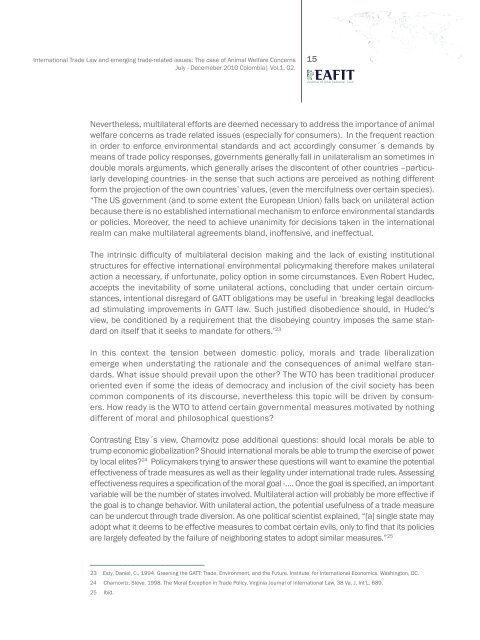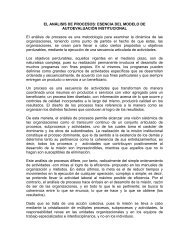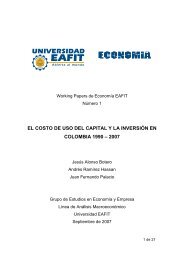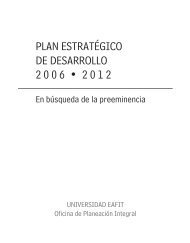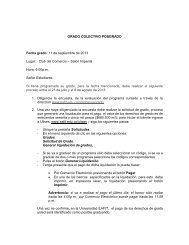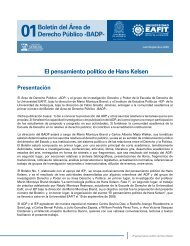International Trade Law and emerging trade-related issues:
International Trade Law and emerging trade-related issues:
International Trade Law and emerging trade-related issues:
Create successful ePaper yourself
Turn your PDF publications into a flip-book with our unique Google optimized e-Paper software.
<strong>International</strong> <strong>Trade</strong> <strong>Law</strong> <strong>and</strong> <strong>emerging</strong> <strong>trade</strong>-<strong>related</strong> <strong>issues</strong>: The case of Animal Welfare ConcernsJuly - Decemeber 2010 Colombia| Vol.1, 02.15Journal of <strong>International</strong> <strong>Law</strong>Nevertheless, multilateral efforts are deemed necessary to address the importance of animalwelfare concerns as <strong>trade</strong> <strong>related</strong> <strong>issues</strong> (especially for consumers). In the frequent reactionin order to enforce environmental st<strong>and</strong>ards <strong>and</strong> act accordingly consumer´s dem<strong>and</strong>s bymeans of <strong>trade</strong> policy responses, governments generally fall in unilateralism an sometimes indouble morals arguments, which generally arises the discontent of other countries –particularlydeveloping countries- in the sense that such actions are perceived as nothing differentform the projection of the own countries’ values, (even the mercifulness over certain species).“The US government (<strong>and</strong> to some extent the European Union) falls back on unilateral actionbecause there is no established international mechanism to enforce environmental st<strong>and</strong>ardsor policies. Moreover, the need to achieve unanimity for decisions taken in the internationalrealm can make multilateral agreements bl<strong>and</strong>, inoffensive, <strong>and</strong> ineffectual.The intrinsic difficulty of multilateral decision making <strong>and</strong> the lack of existing institutionalstructures for effective international environmental policymaking therefore makes unilateralaction a necessary, if unfortunate, policy option in some circumstances. Even Robert Hudec,accepts the inevitability of some unilateral actions, concluding that under certain circumstances,intentional disregard of GATT obligations may be useful in ‘breaking legal deadlocksad stimulating improvements in GATT law. Such justified disobedience should, in Hudec’sview, be conditioned by a requirement that the disobeying country imposes the same st<strong>and</strong>ardon itself that it seeks to m<strong>and</strong>ate for others.’ 23In this context the tension between domestic policy, morals <strong>and</strong> <strong>trade</strong> liberalizationemerge when understating the rationale <strong>and</strong> the consequences of animal welfare st<strong>and</strong>ards.What issue should prevail upon the other? The WTO has been traditional produceroriented even if some the ideas of democracy <strong>and</strong> inclusion of the civil society has beencommon components of its discourse, nevertheless this topic will be driven by consumers.How ready is the WTO to attend certain governmental measures motivated by nothingdifferent of moral <strong>and</strong> philosophical questions?Contrasting Etsy´s view, Charnovitz pose additional questions: should local morals be able totrump economic globalization? Should international morals be able to trump the exercise of powerby local elites? 24 Policymakers trying to answer these questions will want to examine the potentialeffectiveness of <strong>trade</strong> measures as well as their legality under international <strong>trade</strong> rules. Assessingeffectiveness requires a specification of the moral goal -…. Once the goal is specified, an importantvariable will be the number of states involved. Multilateral action will probably be more effective ifthe goal is to change behavior. With unilateral action, the potential usefulness of a <strong>trade</strong> measurecan be undercut through <strong>trade</strong> diversion. As one political scientist explained, “[a] single state mayadopt what it deems to be effective measures to combat certain evils, only to find that its policiesare largely defeated by the failure of neighboring states to adopt similar measures.” 2523 Esty, Daniel, C., 1994. Greening the GATT: <strong>Trade</strong>, Environment, <strong>and</strong> the Future. Institute for <strong>International</strong> Economics. Washington, DC.24 Charnovitz, Steve. 1998. The Moral Exception in <strong>Trade</strong> Policy. Virginia Journal of <strong>International</strong> <strong>Law</strong>. 38 Va. J. Int’L. 689.25 Ibíd.


